#syrian roots
Text
i love my mom and my siblings god knows that but questioning my beliefs because of me having a different ethnic background is uhm. not nice? i think.
#my sister asking my mom wait what country is she from after i show interest in the palestinian cause...#i don't know i feel so weird and alienated and sad and angry. man.#WE'RE BOTH CHILEAN. WE'RE BOTH LATINE. WE BOTH SHARE PALESTINIAN ROOTS. i have a syrian family and she doesn't. that's it. but augh#i'm sick of it all maybe it does not get better.#mon.txt
4 notes
·
View notes
Text
Like spartacus was a fun show it was a starz show where 90% of footage was directed to the lower half of gladiator characters so..u should not pick fights online with ppl over a show like that and if you do sincerely log off
But personally despite liking the show it like most media depicting the classical world is racist and orientalist. No dispute no argument I have a PhD from palestinian made university in recognizing that shit and even tho nasirs arc was pretty good and his relationship with agron a win for lgbt rep uhm.. I can still say orientalist and his character enforced that orientalism by playing the "good" syrian
But I didn't really care bc I expected that type of racism and like this was from 10 years ago
#but romans were racist to syrians blah blah they had the characters we were rooting for say the same racist shit and#the show writers realized they probably were too racist about it and introduced nasir and had crixus apologize to nasir for assuming#he was a liar bc he was syrian but nasir was lying in that moment so it was all bullshit#and they never revisited his heritage then#and orientalism is coupled with fetishism of oriental characters so yeah still is despite show writers intentions sorry not sorry
6 notes
·
View notes
Note
Maybe an ethnostate is an inherently dangerous and immoral idea. What has happened when other people tried to establish ethnostates?
Well firstly, Israel is not an ethnostate. There is no equivalent policy of Israelification or Judaification as there was (tbh is) with Russification, or historic and contemporary Arabization, Modi's attempts at Hindutva, Erdogan's extreme backsliding into ethnonationalism, etc.
Israel is a liberal democratic state. Some Arabs rejected citizenship, as is their right to do so on principled grounds. But most other groups who are not Israeli Jews have implicitly accepted the Social Contract of a modern liberal democratic state. They receive equal rights under the Law (which is enforceable), and they're aware that they're not the majority and that not every aspect of their culture will cater to them or center them.
Most of the country coming to a standstill on Shabbat could be a sign of an ethnostate, but if municipalities don't want to observe Shabbat, there are no enforceable laws that allow anyone to stop them from ignoring Shabbat. And if there are/were, they were much more frequently levied against other Jews.
Israel has historically not cared if its non Jewish citizens practice their own faiths, speak their own languages, observe their own cultural traditions. Jews do not proselytize. If Israel truly were an ethnostate we'd see a repeat of the Edomites being forcibly converted by John Hyrcanus. The reason this hasn't happened is not because Jews are "disgusted" by Palestinians, for the record. A majority of Israeli Jews look identical to Palestinians and historically spoke Judeo-Arabic. It's simply not necessary for any government to function to pursue an assimilationist policy. It's not a priority among any stream of Judaism or any sub-cultural group of Jews.
People's discomfort with a Jewish majority state, that utterly and thoughtlessly centers Jewish culture (through symbols, the calendar, the weekly/monthly/yearly cycle, holidays, etc.) is rooted in antisemitism. Because it's abhorrent to see Jews running the show. It's new, it's weird, it's even a little insulting. It's not the Natural Order of things. It's unfair. This is a primal Judenhass gene being activated, and it applies to everything related to Jews. There's an inherent hypocrisy in most people when it comes to Jews.
Even in a country like Japan which is considered by fascists to be an Ethnostate, that belies the diversity of the country. An ethnostate is not a state with a majority or supermajority of one ethnicity, nor is it a state that has implicit biases toward that majority ethnic group. An ethnostate must legally uphold the supremacy of the ethnic group in question and at best make no attempt to extend equal rights to any minorities. At worst, it will attempt to assimilate them or exterminate them.
Secondly, what happens in real genuine ethnostates? Well to name a few examples: the Apartheid system of Imperial Russia, with the accompanying pogroms that led to the collapse of the Pale of Settlement which ushered in the largest Jewish migration in history. The effects of this system are still being felt today, not just by Jews. The whole reason Putin and most Russians feel entitled to Ukrainian land and feel threatened by a Ukrainian identity is because Russification considered Russians Belarussians and Ukrainians the same people (which meant Belarussians and Ukrainians were to be forcibly assimilated by Russians).
Here's another example: Kurds in Turkey are still not considered a legally recognized ethnic group. They can't even spell their own names correctly because they have letters in their alphabet that do not occur in Turkish, and Turkish is the only language of state (Turkey as a modern state was heavily influenced by France and it shows). Kurds are routinely suspected of being PKK members and whole towns were bulldozed to make room for Syrian refugees, as a collective punishment against the Kurdish insurgency (which restarted amid the war with ISIS).
Saudi Arabia is an ethnostate, as are most of the Gulf Monarchies. Citizenship is a privilege only enjoyed by the Khaleeji Arabs, even though they're a minority in most of their own countries. Palestine is also an ethnostate, citizenship and rights are only offered to those who are deemed Palestinians. Nobody else is allowed to live there. The Israelis who illegally live in the West Bank have to be propped up by a military occupation and have to have Israeli laws stretched over the border to encompass them, because they would not ever be allowed to even live in the West Bank, much less be afforded any rights or citizenship. This is not just Palestine's fault, this was a precedent set by Jordan. The oldest of all Jewish communities in Palestine were all cleansed by Jordanian troops, banished from their lands and never allowed to return.
I hope you can see that ethnostates are not very compatible with liberal democracies, as liberal democracies by definition and by tradition have universal human rights (at least in the West). It is authoritarian and totalitarian regimes that typically strive for an ethnostate. There are shades of ethnostatitude in democracies, such as France, which uses civic identity as the privileged "ethnicity," and that civic identity happens to be French, which means everyone must be culturally French and speak French. Though it's not violently enforced there is a state policy of ignoring all minorities and their cultures. And of course Turkey, which has always been a flawed democracy, but is increasingly becoming dictatorial and wouldn't you know, the more authoritarian it becomes, the more Turkishness is a central component of Erdogan's goals and policies.
Are there Israelis who want Israel to be an ethnostate? Why yes, but are they significant or relevant beyond appointing Ben-Gvir as a token gesture to this radical fringe? Not really, though there's an alarming capacity for them to increase their numbers. Is any of that relevant to the daily functions and moral "core" of Israel as a nation? Not at all. If you don't judge any other state by it's worst most obnoxious most supremacist actors, why judge Israel that way? Is it those Judenhass Genes again?
188 notes
·
View notes
Text
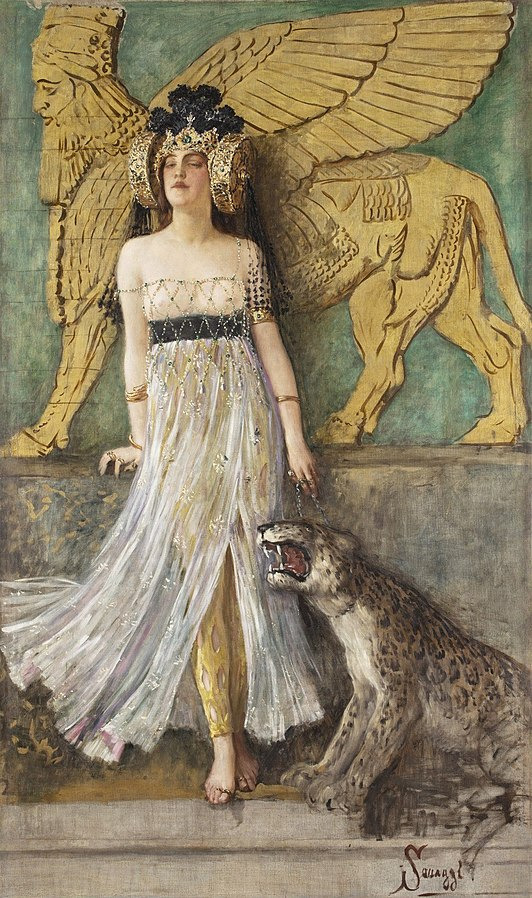
Cesare Saccaggi (1868-1934)
"Great Semiramis, Queen of Assyria" (c. 1905)
Oil on canvas, gold and precious stones
The myth of Semiramis has its roots in late antiquity. Historiography, religion, art and literature have contributed to passing on different and contradictory legends linked to her figure over the centuries: some recognize her as the enlightened Assyrian ruler Shammuramat, wife of King Shamshi-Adad V and regent of his son Addu-Nirari III--to whom we owe the realization of the hanging gardens of Babylon.For others, Semiramis is the daughter of a nymph, abandoned in the desert and then fed by doves - the 'daughter of the air', according to Calderón de la Barca and Carlo Gozzi. Or she is the daughter of the goddess Derceto and the Syrian Caistro, married first to Onne, then to King Nino, with whom she had a son who, according to tradition, when he became an adult, chased her from the throne and killed her. During her reign, Semiramis conquered Mesopotamia, Egypt and Ethiopia. Herodotus and Diodorus Siculus speak of her as a great and good sovereign.
#paintings#art#artwork#painting#female portrait#cesare saccaggi#oil on canvas#fine art#italian artist#gold#precious stones#portrait of a woman#big cat#animals#costume#costumes#history#mythology#assyrian#ancient assyria#aesthetic#aesthetics#white dress#dressess#early 1900s#early 20th century
408 notes
·
View notes
Note
I went to the Nations of the World party and I drew the UAE. Could you help me get into that culture and be big and sexy for the party?
Everything Arabic is currently incredibly in demand… I don't have much choice anymore… But I think I have just the thing here. Just activate. Activation takes three days, transformation will end automatically on 03 November at 08:00. You should still be able to have some fun after the party.
Monday night… A bit early to activate the costume… The party is more than two weeks away… But you can't wait. Every nine hours now, one of your ancestors from your great-grandparents' generation will become of Arab descent. At first you don't feel anything… You spend the evening as usual in front of the television. Everything is normal… You go to bed earlier than usual. At 22:00 sharp. And at 05:00 the alarm clock rings. Your new routine. Breakfast, jogging to the gym, an hour at the weights, jogging home and then second breakfast, shower and off to the office. You're at your desk even earlier than usual. And fit as seldom. You get plenty of compliments. Colleagues ask you if you were on vacation. Fuck, the costume seems to pay off. At lunchtime you go out for falafel. Your mother grew up bilingual. What the fellows behind the counter speak is everything, but not customer-friendly. You've already learned that much Arabic from your mother… You say goodbye with "'ayuha al'iikhwatu, lays hunak nasihat lihadha alealaji." The two fellows stare at you with open eyes. That was better than tipping them.
In the evening you cook your dinner, prepare your breakfast, eat, read a little bit and go to bed at 22:00. You dream wildly and wake up at 5:00 a.m. drenched in sweat. Hair grows on your chest. On a well-built chest. When you finish your training, you are the son of a Syrian mother and an American father. You grew up bilingual. Fluent in Arabic. And still a Christian. Your father prevailed. Sure, your mother told you a lot about the Koran, but religion doesn't interest you much anyway. Your church is the gym, your communion is the protein shake. In the office, all your colleagues ask you about the situation in the Middle East. How you see it. You were once on vacation in Tunisia. These are your experiences with the Middle East. What do you know about that?
At the end of work at 5:00 p.m. your genetics change. You have more Arabic than European roots. You can see it in your body hair. In your eyes. You notice it because you want to smoke a shisha at the end of the day. Everyone knows you in the café. You all speak Arabic to each other. You are still the infidel Christian. But all those who have not yet sucked your uncut dick don't know that. Ahmad, whom you just fucked in the toilet, for example, knows.
Wednesday morning. Prayer times are always good in the winter. You're done with your workout before you go to sunrise prayer. Training and prayer set the rhythm of your day. It is good that you are your own boss. Importing and exporting various things. Exporting cars to the Middle East. Importing… Well, whatever comes along… All kinds of things… By noon prayer, you've lost your American passport. You are a proud citizen of the UAE. There was once a Swedish great-grandmother. But it doesn't show on your face. And you don't notice it yourself.
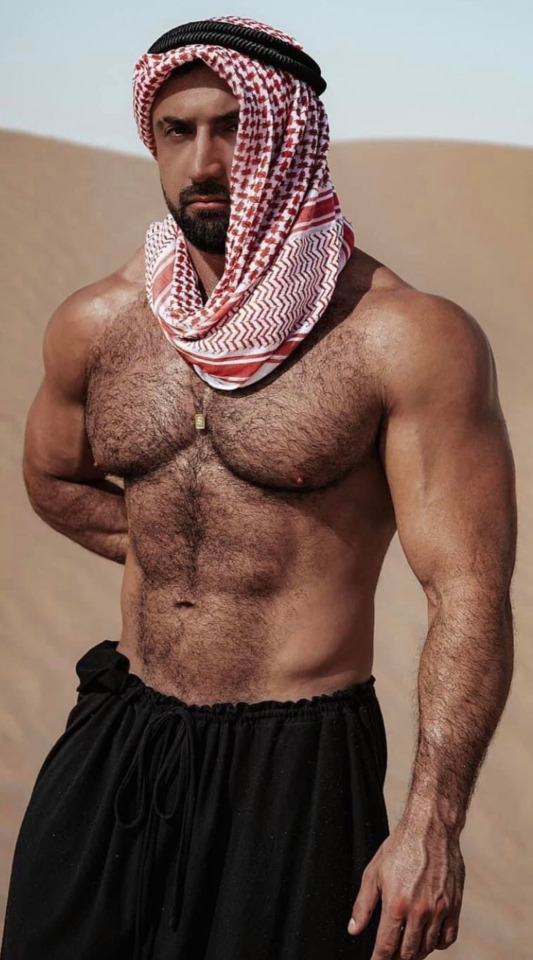
After the sunset prayer, the transformation is complete. Purebred Arabian. A true Arabian hot-blooded stallion. You have been in the States for five years now. A good and permissive life here. Your mother should not know about this. But this is sex, drugs and rock'n'roll. You're looking forward to the Halloween party in two weeks. Costume? You don't need a costume. You just show up…
Inspiration found @fitbearcatcher
#male tf#muscle tf#reality change#chronivac#male transformation#muscle transformation#race change#halloween tf
218 notes
·
View notes
Note
wrt your spotify playlist, do you know which of those artists are transmascs of colour specifically?
I know of a few:
Dreamer Isioma, Beverly Glenn-Copeland, Anjimile, and Mlaika Mfalme are all Black (all American but Mlaika, who is Australian). Dreamer Isioma is Nigerian, Anjimile is Malawian, and Mlaika Mfalme is Tanzanian as well. saint hills is Brazilian, Mavi Phoenix describes himself as "Austrian with Syrian roots," and TOBRE is Egyptian & British.
There may be others who are people of color & I'm just unaware, but those are the ones I know.
#anjimiles song + music video for Animal is fucking gorgeous and everyone should check it out btw#m.#ask box#transmasc art
88 notes
·
View notes
Note
ngl since october i've been feeling very uneasy in fandom, like lots of other users in the ones im familiar in are propalestine which is fine until they start throwing dogwhistles around and reposting obvious misinformation about i/p and dehumanizing jews/israelis/zionists as if that does anything to help palestinians (meanwhile when politicians like biden actually try to help they're either ignored or accused of bizarre conspiracy theories that don't make sense with even basic knowledge about the conflict)
i was guilty of sliding down the rabbit hole myself bc i wasn't thinking critically, like oh, this blogger started reblogging some suspicious stuff like the "river to the sea" stuff but if i don't support it i'm Evil and Hate Palestinians so i reblogged it like the Good Tumblr User i wanted to be. i've had reservations about how weirdly people talk about israel, but they say its progressive and moral, and i fell for their words. in hindsight, i really should've known better than to take them at their word, and now i don't really reblog much about the conflict anymore bc holy shit people really showed themselves to be utterly vile about this conflict and i don't trust a lot of people here anymore
then people i thought were trustworthy started getting really mask off. one semi popular fandom account i followed reblogged jvp as a reliable source, but i later learned from browsing jumblr posts that jvp is actually really antisemitic and basically autism speaks for jews. and in addition they also reblogged stuff about how israelis are all Evil and don't deserve any sympathy for 10/7, which is just cruel. i couldn't associate w/ them in good faith any more. other fandom accounts i used to follow started reblogging some really stomach churning (but concerningly popular) posts such as one about how hamas treated the hostages "so well" and another about houthis supposedly attacking ships for palestine's sake. this and looking beyond my usual fandom circles really opened my eyes to just how toxic and ass backwards this was becoming, and how this kind of vitriol is spilling over into the real world and hurting jews while doing nothing to help palestinians or muslims affected by the concurrent rise in islamophobia. it's so nervewracking. now whenever i see fandom blogs post propalestine stuff w/ "river to the sea" in big letters i feel very wary that they might be hiding more dangerous prejudices under the surface. even those who do try to be more aware about the surge in antisemitism still can't help but put down israelis, dabble in conspiracy theories, and/or condescend to jews or occasionally their allies
honestly kudos to you for staying strong in these times. you're a lot braver than me and you and the rest of jumblr deserve better than this horror show
Thank you for the ask. I would just like to say that i don’t care if people support palestine and i don’t give a shit about the israeli government—i just want them to be normal about israelis and jews and not treat an actual war like team sports and fandomise this. Ideally people should want peace instead of thinking about innocent people in terms of a team they can root for while watching a match on the telly. Unfortunately, while the insanity didn’t start on social media, the current nature of the internet facilitated a really shit union between “activism” and fandom where more people are concerned about fictional antisemitic goblins than they are with real flesh and blood people doxxing jews and forming actual lynch mobs. They sloganeer for actual terrorist groups while ignoring the lives of palestinians and yemenis and lebanese and syrians and iranians directly impacted by them. All we can do is sit tight and hope more people come to their senses at least; if they don’t, then we shouldn’t waste time lamenting them.
49 notes
·
View notes
Text
Shown in this 1824 edition of The Modern Traveler, #British journeymen repeatedly explored the Land of Israel (a/k/a Palestine) in the early 1800s where they always wrote of their observations of Jews.
Jews were mostly poor & mistreated, but they never abandoned their homeland.
Still other #Jews had been consistently returning (making Aliyah) to Israel for millennia since the end of the Jews’ Third Revolt against the Romans in 135 CE.
Though modern political #Zionism - the belief that Jews have a right to self-determination in at least part of their ancient homeland - did not go fully mainstream as the national liberation movement of the #Jewish people until Thedor Herzl’s Der Judenstaat in 1896, the yearning for & imagining of the Jewish future has always centered on the return of #Jewish sovereignty in Israel.
Every year on Passover for centuries, Jews said the words, “Next year in #Jerusalem!”
It has always been the Jewish dream.
And repeatedly saying this phrase every year, while also facing Jerusalem every time a Jew prayed, helped provide the conditions for the maintenance of a cohesive national Jewish identity that survived more than 1,800 of diaspora across the globe.
Books like The Modern Traveler always note the presence of Jews & other groups such as “Turks, Syrians, Bedouin #Arabs … #Latin, #Greek, and #Armenian #Christians, Copts, and Dru[ze].”
One people you will never find named, however, is anyone called “#Palestinians” or “#Palestinian Arabs.” That identity simply did not exist anywhere in the world at that time. In fact, the identity did not go mainstream among Arabs living in the Land of Israel until after the 1967 Six Day War.
As The Modern Traveler also notes, the vast majority of the #Arab population did not have roots in the Land & were instead “nomadic … [t]he true Arab is always an inhabitant of the desert” - a reference to the desert of the #Arabian Peninsula.
In fact, The Modern Traveler notes as many as 10,000 out of a population of ~20,000 people in Jerusalem were Jews (despite the fact that the Land’s far-away rulers from the #Turkish #Ottoman Empire did not technically permit more than 2,000 Jews to live in Jerusalem, this rule was not enforced at the time). Another 5,000 were #Muslims & 5,000 were Christians.
Zionism - despite being a word that has been severely misused by, and turned into some sort of insult by, anti-Israel groups seeking to ignore & remove the Jews' ancient & constant connection with the Land of Israel - is at the very essence of what it means, and has always meant, to be a #Jew.
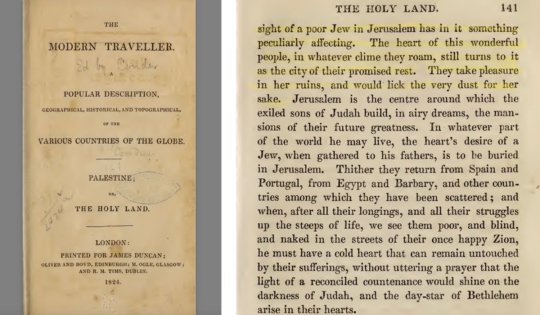
Captain Allen
@CptAllenHistory
55 notes
·
View notes
Text
Syria!Series Part One: Syria: Beau 'Cyclone' Simpson x Reader

Tagging: @crazy4chickennuggets @kmc1989 @withakindheartx @chickensrule @iwannabeinthesequalmrghostface @justameresimp @handsupforamiracle @lxaah11 @librarian1002 @littlebadariell @imaginecrushes @luckyladycreator2 @flrboyd @nani-kenobi @areamir @b-bradshaw @adaydreamaway08 @crimeshowjunkie @shepgurl @ashcosmo @inkandarsenic @caffeinatedwoman @tortilla-maria1 @lemmons1998 @dr-alan-grantler @dizzybee03 @watashiwasun @burningpeachpuppy @penguin876 @haley-hotchner @deliriousfangirl61 @agentorange9595

You’ve been married to Beau three years when he’s deployed to Syria. You’re situated in San Diego, working with the Victim’s Support Service. The two of you have talked about settling down here, you both love the area and Beau’s up for promotion soon which will give him more stability and better choice of assignments. It feels like the right time to put down roots.
The first indication you get that something is wrong is when Commander Larson steps into your office. You’re too enthralled in the casefile you’re reading to register his presence until you hear the door click shut behind him.
It’s the expression in his face that stops you in your tracks. You’ve seen Commander Larson deliver bad news a handful of times throughout your career and he has the exact same look in his eyes now.
“Beau’s been captured.” He tells you.
You don’t hear anything else after that, just the roaring of blood in your ears as selective words filter through. You learn that it had happened during a navy training exercise, that a Syrian officer he had been working with was also taken.
You fall apart, for two whole days you’re a complete mess because the love of your life is missing and there’s fuck all you can do about it.
It’s Soloman that calls you from a military hospital in Damascus, that tells you the unofficial story. Three hours ago Beau had turned up at a military checkpoint gravely injured, dragging Captain Zadir Abadi, along with him. The two of them had been barely alive when they’d been airlifted.
“It’s bad Ally, they tortured him.” Soloman tells you, you can see the gravity of the situation in his features as he rubs his palm over his weary features. “He’s been stabbed multiple times, they’re not sure he’s going to make it through the night.”
You go to church that evening, for the first time since you left Idaho. You light a candle, and you say a prayer because there’s nothing else that you can do and the reality of that devastates you. You don’t sleep, you don’t eat, instead you lie on the couch with a pillow clasped to your chest watching reruns of Friends and waiting for your phone to ring.
Solomon calls again in the afternoon; he looks as exhausted as you feel. His jaw line is peppered with five o’clock shadow and his eyes bloodshot.
“They’ve taken him back into surgery.” He tells you, shaking his head. “He started bleeding again this morning, if they can’t get it under control…”
He looks away from the screen, swallowing hard before he opens his mouth to speak.
“Zahir passed away this morning.” Solomon tells you. “His injuries were too great, infection set in. There was nothing the doctors could do.”
You close your eyes for a second, inhaling through your nose and exhaling through your mouth because you hear the undercurrent of what he’s saying.
Prepare yourself.
You don’t sleep again that night.
***
Beau survives the surgery. He spends days drifting in and out of consciousness, in a haze of agony and numbness. The painkillers they give him are strong, they mess with his head, twisting his dreams and reality into one long nightmare.
The only consistent thought he has is you. He wants you; he thinks he tells Solomon that when he’s semi lucid. The next time he’s awake Solomon hands him his tablet and there you are on the screen, looking as pretty as the day he met you.
“Ally,” He drawls as he settles back into the pillows.
It’s the first time he’s laid eyes on you since this whole ordeal started and he feels so fucking relieved to see you. You were the only thing he thought about during his time in that bunker, the thing that kept him going. Everytime they cut into his flesh, stabbed him, humiliated him, he thought about you, that smile, that laugh, the way you look at him like he was the only man in the entire world.
“Beau.” You whisper and he smiles, tears searing at his eyes because just hearing the sound of your voice soothes something deep inside his soul.
“Talk to me.” He requests, his head coming to rest against the pillows. “I just need to hear your voice.”
Love Beau? Don’t miss any of his stories by joining the taglist here.
Interested in supporting me? Join my Patreon for Bonus Content!
Like My Work? - Why Not Buy Me A Coffee

#beau cyclone simpson#beau cyclone simpson x reader#beau cyclone simpson x you#beau simpson#beau simpson x you#beau simpson x reader#top gun maverick
61 notes
·
View notes
Text
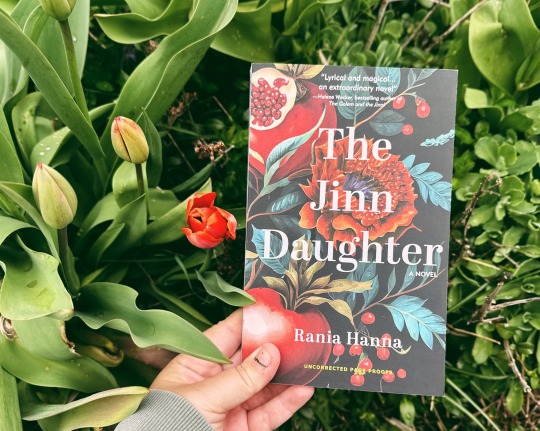
The Jinn Daughter by Syrian-American author Rania Hanna is an emotional, lyrical story rooted in Middle Eastern myth. Nadine is a jinn who each day, must gather the pomegranate seeds of those who have died and eat them, telling their stories in the process and letting them proceed into the afterlife. It is a heavy task, and she isn't always honest with her daughter, Layala, about its burdens. But when Kamuna, Death herself, comes to them and tells them that she needs an heir, and that she wants Layala, Nadine will need to draw on all her magic and strength to try and keep her daughter safe.
This book is a rich bold story grounded in the desperation of a mother to keep a young girl sheltered and safe from a world that hates the jinn and all things magic. The plot unspools in a satisfyingly slow weave, betrayals, violence, and disappointments flowing off the page. I enjoyed the micro tales told within the book itself, small folk tales for the characters to share with each other. A sequel is maybe teased, but I wasn't sure—I think the door was left intentionally open without leaving too many loose threads—so it stays a solid standalone. Not perfect, but consistently enjoyable and I highly recommend the read.
Content warnings for death/grief, child death, violence, suicidal ideation/suicide.
21 notes
·
View notes
Text
The myth of Dionysos (1)
What’s better to complete this Christmas season, alongside some Arthuriana and some ghost stories, than some Greek mythology?
There is a great book in France that serves as a key research reference, and that is called the Dictionary of Literary Myths, composed under the direction of Pierre Brunel. Within this bookthere are several articles covering the complexity and evolution of the Greek gods, both within their own mythology and within European literature as a whole (with a strong focus on French literature, of course, being a French book). Given I do not know if the book was ever translated or not, I thought I’d share some of the text within it. And to begin, I will focus on one of the several articles dedicated to Dionysos – the god you English speakers known as “Dionysus” (even though the whole -us thing stays completely weird for me who grew up with all the Greek names ending in -os). This first article, written by Alain Moreau, is titled “The Antique Dionysos: The Elusive One”, and as the title says, it is a study of the figure of Dionysos within Antiquity.
I will offer here a vaguely-faithful translation of the text – and given it is a longarticle, I will break it down over several parts.
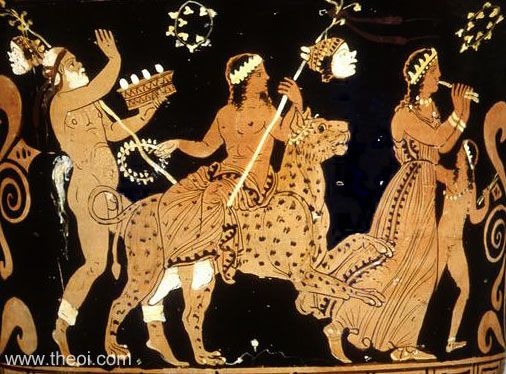
THE ANTIQUE DIONYSOS: THE ELUSIVE ONE
Of all the gods of Olympus, Dionysos is the one whose character is the hardest to define. Despite his many historical uses and the numerous interpretations of mythologists, we cannot fully understand the god. His origins, his childhood, his physical appearance, his behavior, his role in the city, his symbolism… It is all rich, all complex, all fleeting. Dionysos is the god of metamorphosis: the elusive one.
I) The origins: Old god, new god
The impossibility to confine Dionysos within a specific setting already manifests in the beginning of this investigation: the research of the god’s origins is puzzling. There is no doubt that Dionysos is a very ancient god. He was called “Dendrites”, “god of the tree” – and he was even depicted with branches growing out of his chest – which links him to the oldest deities of vegetation and fecundity, the ancient mother-goddesses. For example, the Greek Demeter: Callimachus’ Hymn to Demeter says “Everything that huts Demeter also hurts Dionysos”, and Pindar names him “the consort of Demeter” in his Isthmics. Dionysos is also linked to Cybele, and though her to the Syrian goddess Kubaba – the Dionysos-Cybele link is made clear in Euripides’ Bacchants. There is also the Phrygian mother-goddess Zemelo, whose name sounds strangely like Dionysos’ mother’s, Semele. And all these deities were worshiped in Asia Minor, in Thrace, in Crete, and in the Aegean world. In Athens, very ancient festivals partially celebrate him; Anthesteria, Apaturia, Oschophoria… It explains why Tiresias, in the Bacchants, speaks of “traditions that come from our fathers, and whose age is as old as time itself”. All points out to the Dionysian cult having pre-Hellenic roots. During the Mycenaean era in the middle of the second millennium BCE, his presence was attested by two tablets found at Pylos written in linear B. The name of Dionysos is found in its genitive form: “diwonusoyo”. Bacchants gives us another clue about the ancient nature of the god: beyond the tragedy-of-impiety that is the death-punishment of Pentheus, one can sense a second level of comprehension, maybe hidden to the play’s creator, but that mythologists and ethnologists all perceived. That is to say, a ritual of human sacrifice – the tragedy takes its root in a primitive rite.
And yet, the historian Herodotus claims in his Histories that the name of Dionysos is the last one that the inhabitants of Greece learned when discovering their gods, while Pentheus and Tiresias in Bacchants both call Dionysos a “new god”. A new god, because he is foreign, supposedly coming from Thrace or Asia Minor. Ancient Greeks analyzed his name as coming from a fabulous land, whose exact location kept changing from person to person, but that was always outside of the Greek world: Caucasus, Ethiopia, India, Arabia, Egypt, Libya… Numerous myths tell of the strong difficulties that the cult of Dionysos had to face when implanting itself in Greece – especially in Boeotia, the land of Dionysos’ mother, Semele (who herself was the daughter of Cadmos, the founder of Thebes). Mythologists themselves were fooled and, up until a recent date, most of them believed that Dionysos was a latecomer to the pantheon, an imported god.
Where does this contradiction comes from? It is probably because of how unique the worship of Dionysos was: religious possession, orgiastic rituals, running races throughout the mountains… It always made him an eccentric, isolated god, a god of the people rather than a god of the aristocracy (he plays almost no role within the works of Homer), and as such a much less prestigious deity than the other Olympians. But Dionysos had his revenge: starting from the 8th century BCE onward, it seems that the god “woke up” and was brought back under the spotlight, thanks to women, who spread his cult. Various religious movements coming from Phrygia, Lydia, Thrace and the Greek islands also helped this renewal by revitalizing the old forms of the cult and accentuating its orgiastic aspect. The rise of Oriental cults in Athens at the end of the 5th century made everything go even faster. All these outside additions explain why the Greeks themselves felt that Dionysos was a foreigner and a “new” god. All in all, this look at the god’s origins accentuates one of his most fundamental characteristics: the impossibility to clearly define his personality.
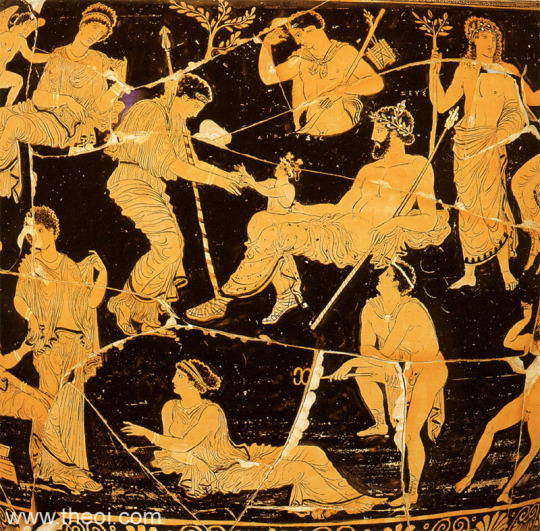
II) A very complicated childhood: births and rebirths
The childhoods of Dionysos all bear the same strangeness. He is a god that is constantly born and that constantly dies, before escaping those that hunt him down, and finally imposing himself definitively. Let’s take a look.
1) Semele, beloved by Zeus, follows the wicked advice of the jealous Hera, and asks the king of the gods to appear before her in his full, shining glory. Zeus, who had made the solemn promise to grant any wish Semele would make, has no other choice but to obey. He appears to her wrapped and surrounded by thunder and lightning, and the poor Semele dies because of it. She was in her sixth month of pregnancy – and Zeus saved Dionysos from death, by ripping the fetus away from his mother’s belly, and placing it in his own thigh. There, Dionysos finished his growth during three more months, before finally being “born” out of Zeus’ leg. This is why one of the etymologies of “Dionysos” means “the god born twice”. In France, it also led to the common expression “se croire sorti de la cuisse du Jupiter” ; “to believe one’s got out of Jupiter’s thigh”.
2) The god Hermes, by order of Zeus, gives the child to king Athamas and queen Ino, rulers of Orchomenos. They raise the little Dionysos by forcing him to wear feminine clothes, in hope that Hera will not recognize him disguised as a girl. Unfortunately Zeus’ wife is not fooled, and she turns Dionysos’ foster parents insane. Zeus then transports his child towards Nysa, and entrusts him to the nymphs of the region. This time, it is said that he was turned into a kid (as in a baby goat). In the Homeric version of the story (found in Iliad, VI), Nysa is replaced by “the divine Nyseion”, a Thracian mountain where rules king Lycurgus. Lycurgus ended up hunting down the nurses of the child and wounding them – the terrified Dionysos jumped into the sea to flee the attack, and ended up protected by the goddess Thetis. [Note: Jeanmaire offered an alternative reading of the Homeric tale, proposing that maybe the Nyseion was actually the name of the "country of the Nysai", aka the land of the Nymphs, which would make it an Ancient Greece version of Elfland or Fairyland]
3) Finally, there is the Cretan legend of Dionysos-Zagreus. While the legend was only recorded by very late text, in truth it seems to be a very ancient story: the name Zagreus first appears in the 6th century BCE in the Alcmeonis, and then came back in the first half of the 5th century within Aeschylus’ Sisyphus the Runaway. In the Zagreus story, Dionysos is given a new group of nursing parents: the Kouretes. As they dance with their weapons around the child and do not pay attention, the Titans discreetly reach Dionysos-Zageus and lure him away using toys (a ball, a spinning top, a mirror, a fleece, jackstones, apples, a bullroarer…). Once they had him, the Titans killed him, dismembered him and cooked the pieces of his body within a cauldron before roasting them and eating them. Zeus struck the Titans with his lightning, but hopefully could resurrect the young god, using his still-beating heart that had been saved by Athena from the Titans’ gruesome feast.
Next time: The Shapeshifting God, and A Complex Personality
35 notes
·
View notes
Note
What's happening in Palestine truly brought out the worst in people. I've been blocking people left and right. Folks try to give positive examples of rebellions from the past like the end of apartheid and the Haitian Revolution,some ghouls respond by saying "Well,those are not good examples because look how poor and corrupt those countries are now", annoying white homonationalist gays don't shut up about how it's bad to root for Palestinians because they "push gay people off roofs and behead them" (Pinkwashing really worked on their pea sized brains,some of them even went on sponsored trips to Tel Aviv 🤮)even f*cking radfems found the video of a 13 year old girl who gave interviews twice in three years and say "Well why is she wearing a hijab now????I won't root for people who put a hijab on a kid!!!" The genocidal ghoul who is unfortunately the president of the USA says "I mean civilians die in wars it's inevitable and idk if Palestinians are telling the truth so idk the numbers of dead people" while dumbass USamerican liberals STILL talk about "harm reduction" I mean,how do these people not hear how repulsive they sound? How can anybody's support for people who are the target of a literal GENOCIDE be conditional? My god I knew westerners were drowning in racism and Islamophobia but the depth of their hatred really is vomit inducing. I pray we all get to see a free Palestine and the fall of all war mongering capitalist empires that funded not only Palestinian,but also Afghan, Iraqi, Yemeni, Libyan,Syrian and so many more people's suffering in our lifetime. I pray it won't be exhausting to just exist as people from SWANA in the future. I pray they all thrive and not just survive in the future. I have hope because how can I not when Palestinians themselves still do,and it feels shameful to momentarily lose hope when I'm just a privileged woman following updates from the comfort of my home.
You articulated so much of what I'm feeling too. I think what makes it worse is how so much of the propaganda we're seeing is the same kind of propaganda the West used to justify the invasion of Iraq, Iran and Syria. All of it has been debunked. Yet people fall for it again and again and again and SWANA people die for that. The truth is right in front of people but they refuse to see it because they've become so comfortable not seeing Brown and Black bodies as human. It feels crazy. And yeah it is utterly strange to see people you share a culture with being massacred day in day out and to feel utterly destroyed by that, only for people to claim it's a lie, and then to also rmr what we feel is trivial to what people in Palestine are enduring. And as you said, they have hope and rage and so must we.
39 notes
·
View notes
Text
I would like to draw your attention to the kind of information surge that Ukrainians have to live in:
1. a photo of a two-year-old child killed by a russian missile.
2. Jim Cummings praising zvyagintsev's films.
My sister tells me that people from the West always divide cinema and war. But I want the only thing that westerners will divided is russia.
I want to talk about zvyagintsev in a little more detail. In 2022, he gave an interview to anton dolin (this is the clown that Ridley Scott said fuck you). This interview perfectly illustrates how the so-called intellectual elite of russia is completely detached from the russian people, illustrates the terrible naivety, criminal blindness and stupidity of these people. For example, zvyagintsev says that the russians who remained in russia are hostages (oh, poor people, we from Ukraine can help with something). The mantra about the hostages is so deeply rooted in the consciousness of the so-called liberal russians. It protects them from the realization that their fellow citizens have turned into animals begging for blood. Then he says that you need to let this war into yourself (remembers Bucha and starts to cry. Ten points for acting) to accept the conflict and the words that a person tells you, because one day she will understand that she was wrong. He says that "it is not necessary to multiply the war, conflicting with people who support the war, it is necessary to listen to them." The great peacemakers, the russians, who do not want to multiply the war around them, have been turning a blind eye to theave been turning a blind eye to the annexation of Crimea and the occupation of Ukrainian territory, to the torture chambers and the sentences imposed on Crimean Tatars for eight years.
Then he asks: "Why didn't we react when we bombed Syria? Well, because it is far. And Ukraine is close and Ukrainians are close to us." That is, when Russia was razing Aleppo to the ground, it was okay, because you didn't have to pay for it, but when Ukraine was attacked and sanctions were imposed, it became inconvenient to keep silent. Remember, Syrian, the russian director does not care that his country bombed your cities, because you are not a neighboring country.
"I cannot agree with people who say that we should forget and ignore russian culture, people sitting in bomb shelters cannot think otherwise, but it will all pass." It will all pass. This cynical phrase just cracked me up.
"I don't understand to whom culture is to blame, to whom Rachmaninoff and our cinema are to blame." In front of all countries where you are your culture is used as a marker of conquest. How are the Pushkin monuments in Syria? How is the Mariupol theater is closed with a banner with Russian writers and Ukrainian artists that you want to own? Your culture is a cancer, it comes first and only death follows.
"We have nothing else to do but make movies." What about raising money for the Ukrainian Armed Forces, supporting the Ukrainian army, so that the war ends soon and Ukraine wins? No? Well, okay.
A russian director who shoots his new movie in Europe has the opportunity to do so, all he has to do is say I am against the war and all doors are open for you. Whereas some Ukrainian artists do not physically have this opportunity. At the moment, there are no Ukrainian films at Cannes, but there is a russian film. Who is to blame for a culture that shouts into a loudspeaker, trying to drown out the victim?


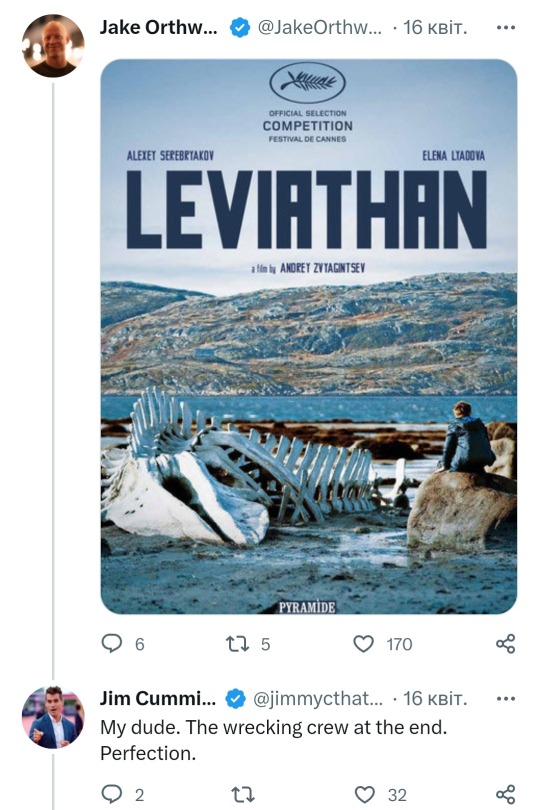
110 notes
·
View notes
Text
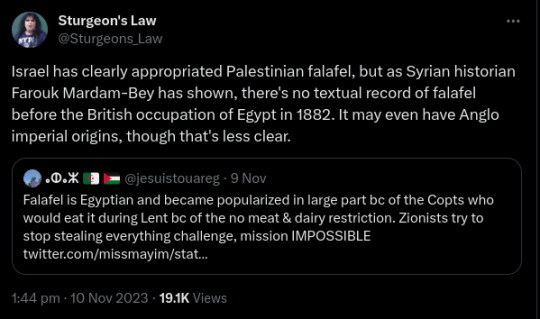
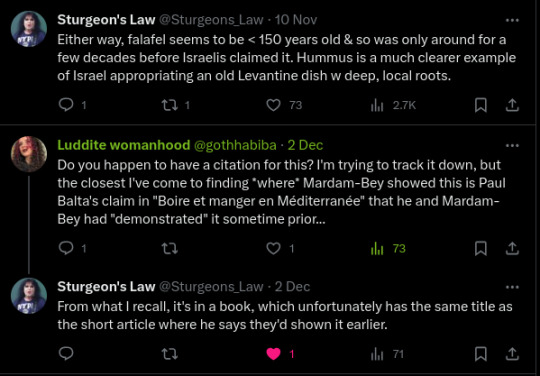
[ID: QRT by ⴰⵀⴰⵣ 🇩🇿 🇵🇸 (@jesuistouareg) reading: "Falafel is Egyptian and became popularized in large part bc of the Copts who would eat it during Lent bc of the no meat & dairy restriction. Zionists try to stop stealing everything challenge, mission IMPOSSIBLE." This was QRTed by Sturgeon's Law (@Sturgeons_Law), who added: "Israel has clearly appropriated Palestinian falafel, but as Syrian historian Farouk Mardam-Bey has shown, there's no textual record of falafel before the British occupation of Egypt in 1882. It may even have Anglo imperial origins, though that's less clear. Either way, falafel seems to be < 150 years old & so was only around for a few decades before Israelis claimed it. Hummus is a much clearer example of Israel appropriating an old Levantine dish w deep, local roots." I (Luddite womanhood, @gothhabiba) commented: "Do you happen to have a citation for this? I'm trying to track it down, but the closest I've come to finding where Mardam-Bey showed this is Paul Balta's claim in "Boire et manger en Méditerranée" that he and Mardam-Bey had "demonstrated" it sometime prior…" Sturgeons_Law replied: "From what I recall, it's in a book, which unfortunately has the same title as the short article where he says they'd shown it earlier." End ID]
What ho! A lead!
25 notes
·
View notes
Note
Moments ago during the last night of the county fair my friends and i decided to go, there were many people and many atractions to play, while my friends decided to go to some atractions that i wasnt interested, i saw a muscular tanned hairy bald man with a manly beard wearing a black shirt with white pants and bots, standing in the middle of the crowd, he saw at my direction for some seconds then left to a tent where was sign saying "fortune teller, enter if you want to know your fate". I entered and a old man offered to read my hand, and after some moments i wasnt myself anymore
You're a typical WASP. Dutch and Swedish roots. A bit unathletic. But educated, liberal… What are you supposed to do with a fortune teller?
"You come from a country far away" Great, you think. Another person who doesn't tell you the future but tells you things you've known for a long time. And anyone could have told you that you are not from here with your black hair and brown eyes.
"You have a strong and assertive personality. A real fighter." Yes, the fortune teller is flattering you a little. But there's nothing wrong with a little flattery. We're all a little vain. You flex the muscles of the arm he's holding.
"You've always had to stand up to strong opponents." Which the guy can bet his ass on. You've never been given anything. Not in your childhood, before the civil war devastated your Syrian homeland, not in the times when bombs took your parents and your home, not when you fled here. And not since you have been here. But you are a fighter.
"You are a strong man who can hit hard. You move big weights." Oh my God, you think. Who would have guessed. The calluses on your hands are not from holding a fountain pen or typing on a keyboard. And neither are your broad shoulders. It's really obvious that you're no stranger to the gym.
"Whatever they tackle, it will be a success, it will be gold!" Ah, finally we come to the interesting part. Just the fact that you are here today, that you have your own stand at FIBO, one of the most important fitness fairs in the world, is already a huge success for you. You are here to present your new fitness app. But also to put yourself in the limelight. Because you can't yet make a living from your app alone. You also need lucrative advertising contracts.
"Champ, now stop with the manicure and take care of your sponsors!" The booming bass of your manager shakes the backstage area. He stands in the doorway of the room where your calloused hands are being shaped. A muscular tanned hairy bald man with a manly beard wearing a black shirt with white pants and boots.

He's right, but looking good is the be-all and end-all here at the trade fair. Hopefully you'll be shaking a lot of hands over the next few days. And your hands need to be just as shiny as you are. You thank the manicurist who is giving your hands a final massage. Excellent work. And most importantly, she didn't talk while she was working. You have it when you have to talk in situations like this or are told things that you either already know or are not interested in.
A quick look in the mirror. Perfect complexion, perfect hair. The show can begin.

The next few days are going to be hell. Pitches to investors, posing for fans, toadying to sponsors. But you are a fighter. And a professional. And whatever you touch turns to gold!
84 notes
·
View notes
Text
Deep dives into folklore: Mermaids

I have heard in many places this year that 2023 is the year of the mermaid, with rise of ocean inspired fashion, release of the little mermaid and one could even say with dua lipa's mermaid barbie. Before the now wholesome representations of the mermaid, they were represented women's sexuality and vengence.
The origins of the mermaid can be traced back to ancient civilizations, where tales of sea creatures with human-like features appeared in various cultures. In Mesopotamia, the goddess Atargatis was depicted with a fishtail, while the Babylonian deity Ea was associated with water and wisdom. In Greek mythology, the sirens were alluring, half-bird, half-woman creatures who lured sailors to their demise with their enchanting songs. Though not exactly mermaids, these early figures laid the foundation for the concept of human-fish hybrids.
The mermaid we are more familiar with today has its roots in medieval folklore and maritime legends. One of the earliest written accounts of mermaids can be found in the ancient Syrian tale of "The Story of Simbad," which dates back to the 8th century. In this story, the protagonist encounters fish-tailed women on an island, emphasizing the allure and danger associated with these creatures.
During the Middle Ages, mermaids increasingly appeared in European folklore, often portrayed as seductive beings who used their beauty and mesmerizing songs to entice sailors to their doom, possibly taking influence from the sirens of greek mythology. These mermaids were seen as symbols of temptation, warning against the dangers of desire and the unknown depths of the sea.
The Renaissance period brought a shift in the perception of mermaids. As exploration and trade expanded, sailors returned with exotic tales and souvenirs, including depictions of mermaids. Artists of the time were inspired by these accounts and started to portray mermaids in their works of art. Renowned painters such as Hieronymus Bosch and Hans Christian Andersen's iconic "The Little Mermaid" further fueled the mermaid's popularity, embedding her in the realm of literature and art for generations to come.
As scientific knowledge advanced, mermaids gradually lost their mythical status and were relegated to the realm of superstition. The Age of Enlightenment and the rise of rationalism questioned the existence of such fantastical beings. Exploration and scientific discovery revealed the true nature of marine creatures, and mermaids were exposed as mere products of human imagination.
However, the mermaid's allure persisted even in the face of reason and skepticism. In the 19th and 20th centuries, the mermaid took on new forms in pop culture. P.T. Barnum, who you may recognise from the greatest showman, capitalized on the public's fascination with the unknown by exhibiting "The Fiji Mermaid," a grotesque hoax of stitched-together animal remains. Mermaids also made appearances in literature, such as "Peter Pan," where the character of Mermaid Lagoon adds a touch of enchantment to the story.
In the 20th century, mermaids experienced a renaissance in film and television. The original Disney Little Mermaid (1989) transformed the mermaid into a beloved and relatable heroine, providing a new narrative that focused on themes of personal agency, self-discovery, and true love. This reinvention not only delighted audiences but also cemented the mermaid's status as a cultural icon.
With the advent of the internet and social media, mermaids have experienced a resurgence in contemporary culture. Mermaid subcultures have emerged, with enthusiasts participating in mermaiding activities, donning elaborate tails, and engaging in underwater performances. The mermaid has also been adopted as a symbol of environmental activism, reminding us of the delicate balance between human activities and the preservation of marine ecosystems.
Overall, the concept of the mermaid has undergone a remarkable transformation over time. From ancient myths and folklore to modern-day popular culture, the mermaid has evolved from a cautionary tale of temptation to a cherished symbol of beauty, adventure, and environmental consciousness. The enduring fascination with mermaids serves as a testament to their enduring appeal and their ability to adapt to the ever-changing currents of human imagination.
#writeblr#writers of tumblr#bookish#booklr#writing#fantasy books#creative writing#book blog#ya fantasy books#ya books#bookworm#books#book review#bogin#books & libraries#novel writing#writers block#tumblr writers#writblr#writerblr#writers#writers corner#writers on tumblr#writing blog#writing community#writers and poets#book#bookblr#book quotes#reading
48 notes
·
View notes